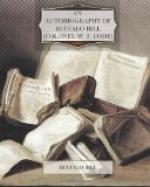Our sojourn in Rome was lively with incident. The Prince of Simonetta, who visited the show, declared that he had some wild horses in his stable which no cowboy could ride. The challenge was promptly taken up by some of the dare-devils in my party. That the horses might not run amuck and injure anyone, special booths were erected in the show arena, where the trial was to be made.
The greatest enthusiasm was manifested by the Romans in the performance, and it was clear to me that most of them looked eagerly forward to the mortal injury of some of the members of my company. The Latin delight in sports like those of the old Roman arena had by no means died out.
When the horses were loosed in the ring they sprang into the air, snorted, kicked up their heels, and plainly defied any of the cowboys to do so much as to lay a hand on them. But in less time than I can tell it the plainsmen had sent their lassos hurtling through the air, and the horses discovered that they had met their masters. The audience, always strong for the winners, forgot their disappointment in the absence of fatalities, and howled with delight as the cowboys, one after another, mounted the fractious horses and trotted them submissively about the arena. We closed this tour of Europe, which was successful to the end, with a second visit to England.
I have now come to the end of my story. It is a story of “The Great West that Was,” a West that is gone forever.
All my interests are still with the West—the modern West. I have a number of homes there, the one I love best being in the wonderful Big Horn Valley, which I hope one day to see one of the garden spots of the world.
In concluding, I want to express the hope that the dealings of this Government of ours with the Indians will always be just and fair. They were the inheritors of the land that we live in. They were not capable of developing it, or of really appreciating its possibilities, but they owned it when the White Man came, and the White Man took it away from them. It was natural that they should resist. It was natural that they employed the only means of warfare known to them against those whom they regarded as usurpers. It was our business, as scouts, to be continually on the warpath against them when they committed depredations. But no scout ever hated the Indians in general.
There have been times when the Government policy toward the Indians has been unwise and unjust. That time, I trust, has passed forever. There are still many thousand Indians in the country, most of them engaged in agricultural pursuits. Indian blood has added a certain rugged strength to the characters of many of our Western citizens. At least two United States Senators are part Indian, and proud of it.
The Indian makes a good citizen, a good farmer, a good soldier. He is a real American, and all those of us who have come to share with him the great land that was his heritage should do their share toward seeing that he is dealt with justly and fairly, and that his rights and liberties are never infringed by the scheming politician or the short-sighted administration of law.




